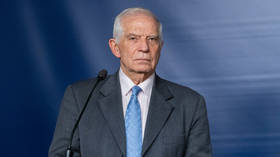America’s “spoiled child” holds the key to Middle East peace

Despite reassuring words out of Washington that a two-state peace deal is possible for the Israelis and Palestinians, the facts on the ground tell a very different story.
Today’s online edition of Haaretz, the Israeli daily, shows a photograph of two bulldozers scraping the dusty terrain in the West Bank accompanied by the headline: “Settlers broke ground on nearly 600 homes since end of freeze, survey shows.” Just below is another story, entitled: “Clinton: Two-state solution still possible for Israel, Palestinians.”
These wildly diverging articles illustrate the chasm that exists between the United States and Israel over the question of Jewish settlements in the West Bank.
The first article, quoting the Associated Press, announces that “…settlers have begun building new homes at a quick pace since the government lifted its moratorium on West Bank housing starts – almost 550 in three weeks, more than four times faster than the last two years.”
The article reported that many of the settlements are being built in areas that would be incorporated into any future Palestinian state; this trend will severely hampers any hope for a lasting peace.
According to an AP survey, construction has begun on 544 new West Bank homes since September 26, the date when Israel ended its 10-month moratorium on new settlement building.
“Nearly 300,000 settlers now live in the West Bank,” AP reported, “along with 2.2 million Palestinians. Settlers have covered the territory – captured by Israel in the Six Day War in 1967, along with Gaza and east Jerusalem – with an increasingly intricate web of established communities and nearly 100 unauthorized hilltop outposts.”
Meanwhile, the Obama administration has been trying to persuade Israel to extend the construction moratorium. Washington is pushing for a one-time two-month extension, during which time the Israelis and Palestinians would be expected to reach agreement on the future borders of a Palestinian state. These efforts, however, have been hampered by next month’s highly anticipated midterm elections, in which the Democrats are expected to suffer setbacks due to public impatience with the sluggish economy.
Meanwhile, the Palestinians are demanding a total freeze on settlement construction for the duration of negotiations, saying two months is not sufficient time to reach an agreement.
The next article from Haaretz quotes parts of Hillary Clinton’s address to the annual conference of the American Taskforce for Palestine, an organization founded in 2003 that advocates the creation of a Palestinian state, in Washington, DC.
"We remain convinced that if they persevere with negotiations,” Clinton said, “the parties can agree on an outcome that ends the conflict; reconciles the Palestinian goal of an independent and viable state based on the 1967 lines, with agreed swaps."
"We have a moment in time and we must seize…The Obama administration will not turn their backs on either the people of Palestine and Israel. They will continue working for and, God willing, achieving peace."
The Secretary of State then said the “goal [of a two-state solution] is now the official policy of the United States.”
Below the diplomatic niceties, however, Washington understands that without a freeze on settlement construction – on the very land that is supposed to be the site of the new Palestinian state - the peace talks will implode.
US State Department spokesman Philip Crowley last week criticized Israel for its decision to resume building in East Jerusalem.
"We were disappointed by the announcement of new tenders in East Jerusalem yesterday. It is contrary to our efforts to resume direct negotiations between the parties," said Crowley.
Is Israel behaving like a “spoiled child”?
This week, New York Times columnist Thomas Friedman suggested that Israel, which is indulged with extensive American support at every turn, is behaving like a spoiled child in its relations with the United States.“It is a measure of how spoiled Israel has become that after billions and billions of dollars in US aid and 300,000 settlers already ensconced in the West Bank,” Friedman writes, “Israel feels no compunction about spurning an American request for a longer settlement freeze – the only purpose of which is to help the United States help Israel reach a secure peace with the Palestinians.”
The Pulitzer Prize-winning writer then imagined what so many Americans would like to hear from the Israeli side: “You know, Mr. President, we're dubious that a continued settlement freeze will have an impact. But you think it will, so, let's test it. This one's for you."
It is hard to believe that Israeli Prime Minister Benjamin Netanyahu, the veteran politician who is enjoying his second stint as prime minister (he served in the same capacity from 1996 to 1999), is bowing to settler demands simply because he is worried about a political dogfight.
Netanyahu certainly has the power, influence and political balls to contain even the most provocative members of his government, like Avigdor Lieberman, the minister of foreign affairs, who has been labeled a racist ultra-nationalist by many commentators, not least of all by Jewish columnists in the United States.
“Yes, I know,” Friedman continues. “Netanyahu says that if he did that then the far right-wingers in his cabinet would walk out. He knows he can't make peace with some of the lunatics in his cabinet, but he tells the US that he only wants to blow up his cabinet once – for a deal. But we will never get to that stage if he doesn't blow it up now and construct a centrist coalition that can negotiate a deal.”
Friedman then attacks the notion that Barack Obama is somehow “anti-Israel,” and provides some good reasons why that notion is totally inaccurate.
“Please spare me the nonsense that President Barack Obama is anti-Israel. At a time when the president has made it one of his top priorities to build a global coalition to stop Iran from making a nuclear weapon, he took the very logical view that if he could advance the peace process in the Middle East it would give him much greater leverage to get the Europeans and the United Nations behind tougher sanctions on Iran.”
Friedman then reminds us that “Israel can't remain a Jewish democracy in the long run if it continues to control 2.5 million Palestinians in the West Bank.”
His advice: “Abbas is weak and acts weaker. Netanyahu is strong and acts weak. It is time for both to step it up. And it is time for all the outsiders who spoil them to find another hobby.”
The question is: Do the Palestinians have any hope of achieving sovereign-state status if the United States, a well known ally of Israel, continues moderating the peace talks? More than a few observers say the answer is “no.”
With peace talks looking on the verge of collapse yet again, Palestinians are reportedly discussing the idea of taking their case “to the United Nations, the International Court of Justice and other forums to achieve recognition of Palestinian statehood,” The New York Times reported Wednesday.
"We cannot go on this way," former peace negotiator Hanan Ashrawi of the Palestine Liberation Organization told the Times. "The two-state solution is disappearing. If we cannot stop the settlements through the peace process, we have to go to the Security Council, the Human Rights Council and every international legal body."
Meanwhile, Israeli officials are vehemently opposed to the idea of having a solution imposed by outside parties, the Times said.
Israel wants Washington to publicly reject such an approach, which the administration of Barack Obama has so far refused to do.
Should the government of Benjamin Netanyau fight harder for a final peace deal with the Palestinians, even agreeing with the United States to enforce another settlement moratorium, or should it gamble further, risking the best friend it has?
It is clear that only through the strong leadership of a time-tested politician like Mr. Netanyahu can Israel’s hard-right be won over to any peace deal. A weaker Israeli leader will never be able to bring all the different factions together in agreement like Bibi can.
The key to peace is in Netanyahu’s court. It won't remain there forever.












